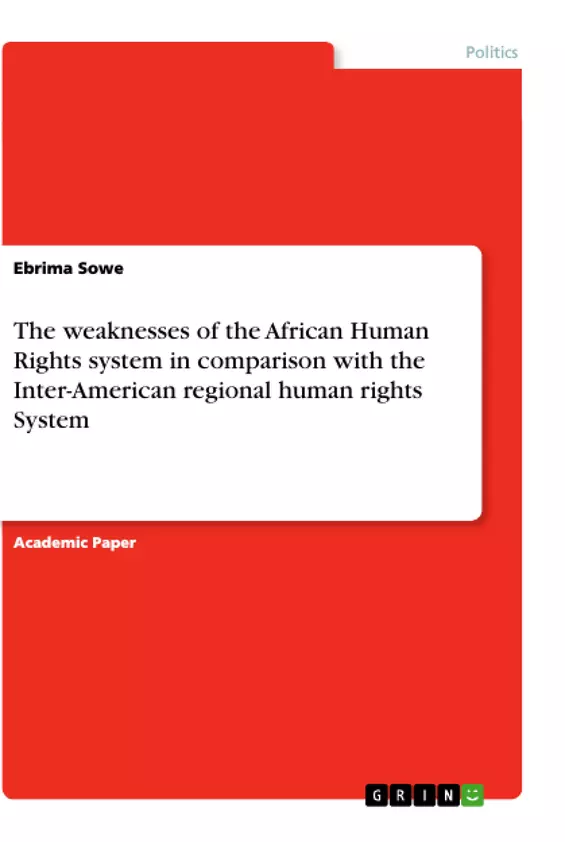The discussion in this paper includes a background of the formation (architecture) and the role of accountability played by the regional human rights system (i.e. the African Human Rights System in particular as it is the topic under discussion).
The African Human Rights System is seen by many as a weak mechanism that ought to aim for the promotion and protection of human rights in the region. This could be as a result of various legal, professional and financial incapacities. In essence, the urgent need for adjustment in the African Human Rights system prompts me to end with some possible recommendations in this article taking my point of reference from other regional human rights systems such as the Inter-American human rights system.
The article also reveals the functional weaknesses of the regional Human Rights system which includes vague provisions in the African Charter, weak judicial arbitration and State
compliance mechanisms. Recommendations in this article are drawn from the Inter-American Human Rights system which has more effective implementation mechanisms.
Inhaltsverzeichnis (Table of Contents)
- Introduction
- Historical Background on Functional Framework
- Weaknesses of the System [with recommendations]
Zielsetzung und Themenschwerpunkte (Objectives and Key Themes)
This article analyzes the weaknesses of the African Human Rights System in comparison to the Inter-American regional human rights system. It aims to identify areas where the African system falls short of effectively promoting and protecting human rights and suggests recommendations for improvement, drawing inspiration from the Inter-American system's more effective implementation mechanisms.
- The shortcomings of the African Human Rights System in promoting and protecting human rights.
- The effectiveness of the Inter-American system's implementation mechanisms.
- The importance of complementarity in regional human rights systems.
- The role of accountability in addressing human rights violations.
- The challenges of enforcing human rights in the African context.
Zusammenfassung der Kapitel (Chapter Summaries)
- Introduction: This chapter introduces the concept of human rights systems at the national, regional, and international levels, highlighting the principle of complementarity and the role of regional bodies like the African Court on Human and Peoples' Rights.
- Historical Background on Functional Framework: This chapter delves into the establishment of the African Human Rights System under the auspices of the African Union. It details the roles of the African Commission on Human and Peoples' Rights and the African Court on Human and Peoples' Rights, emphasizing their supervisory mechanisms and the procedures for receiving complaints.
- Weaknesses of the System [with recommendations]: This chapter discusses the various weaknesses of the African Human Rights System, including the presence of "clawback" clauses in the African Charter, vague provisions, and challenges in judicial arbitration and state compliance mechanisms. It recommends adopting the Inter-American system's approach to addressing these issues.
Schlüsselwörter (Keywords)
Key themes and terms discussed in this article include complementarity, clawback clauses, the African Charter, treaties, conventions, judicial arbitration, state compliance mechanisms, and the Inter-American Human Rights System.
Frequently Asked Questions
What are the main weaknesses of the African Human Rights System?
The system faces legal, professional, and financial incapacities, including vague provisions in the African Charter, weak judicial arbitration, and poor state compliance mechanisms.
What are "clawback clauses" in the African Charter?
Clawback clauses are provisions that allow states to restrict human rights based on national law, which can significantly weaken international human rights protections.
How does the African system compare to the Inter-American system?
The Inter-American regional human rights system is considered more effective due to stronger implementation mechanisms and better state compliance compared to the African system.
What bodies make up the African Human Rights System?
The primary bodies are the African Commission on Human and Peoples' Rights and the African Court on Human and Peoples' Rights.
What is the principle of complementarity in this context?
Complementarity refers to the relationship between national, regional, and international human rights systems, where regional bodies support and fill gaps left by national systems.
- Arbeit zitieren
- Ebrima Sowe (Autor:in), 2019, The weaknesses of the African Human Rights system in comparison with the Inter-American regional human rights System, München, GRIN Verlag, https://www.grin.com/document/509902



